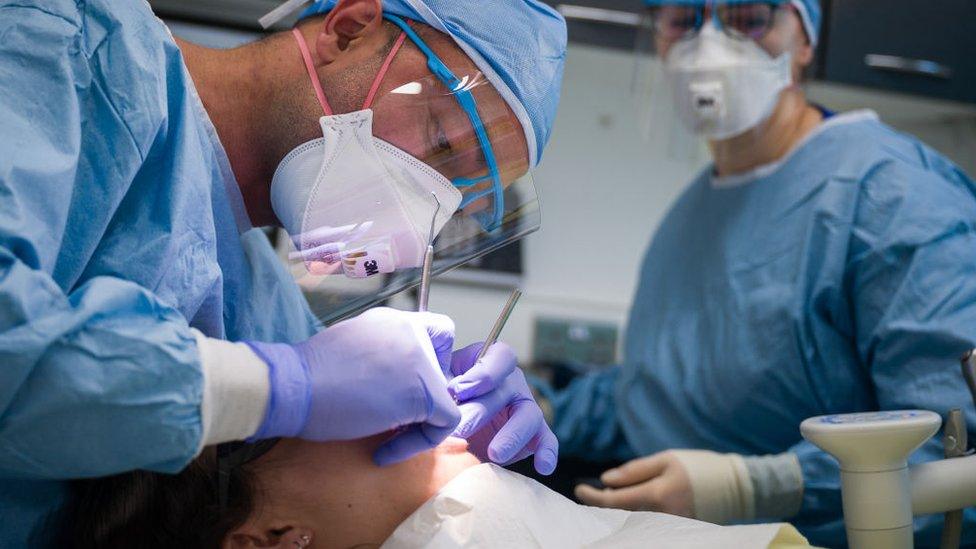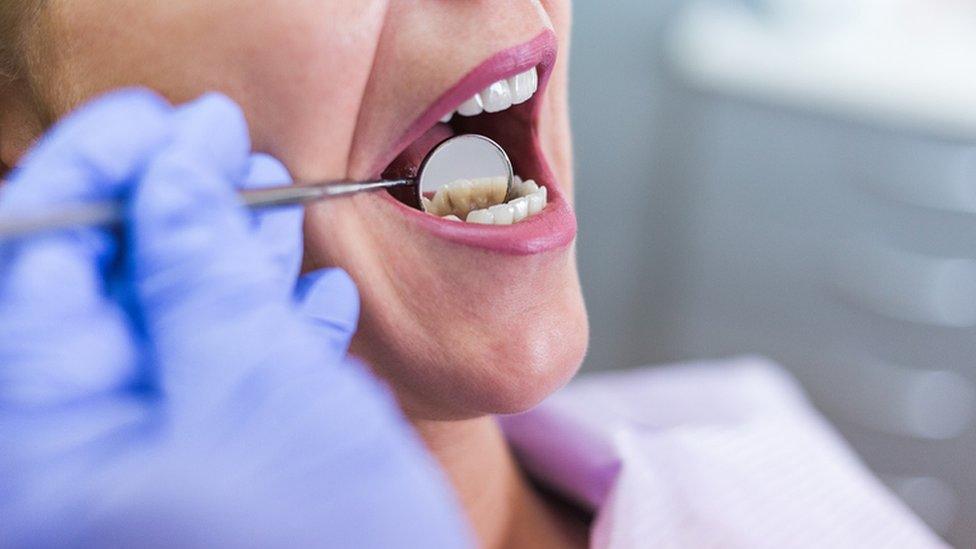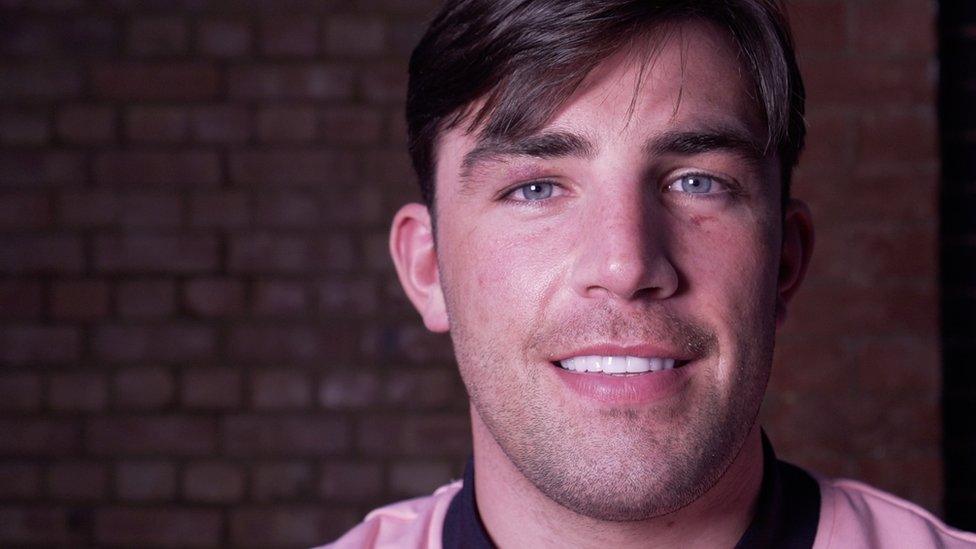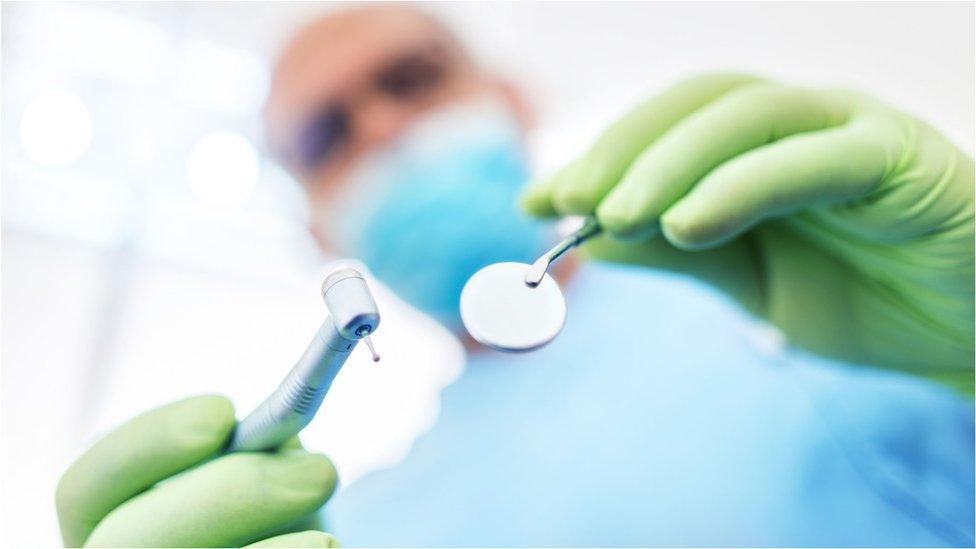Full extent of NHS dentistry shortage revealed by far-reaching BBC research
- Published
- comments

Nine in 10 NHS dental practices across the UK are not accepting new adult patients for treatment under the health service, a BBC investigation has found.
In a third of the UK's more than 200 council areas, we found no dentists taking on adult NHS patients.
And eight in 10 NHS practices are not taking on children.
The Department of Health said it had made an extra £50m available "to help bust the Covid backlogs" and that improving NHS access was a priority.
BBC News contacted nearly 7,000 NHS practices - believed to be almost all those offering general treatment to the public.
The British Dental Association (BDA) called it "the most comprehensive and granular assessment of patient access in the history of the service".
While NHS dental treatment is not free for most adults, it is subsidised.
The BBC heard from people across the UK who could not afford private fees and said the subsidised rates were crucial to getting care.
The lack of NHS appointments has led people to drive hundreds of miles in search of treatment, pull out their own teeth without anaesthesia, resort to making their own improvised dentures and restrict their long-term diets to little more than soup.

Some people are going to extraordinary measure to do DIY dentistry as they struggle to find affordable dental care. Are we witnessing the death of NHS dentistry?

The investigation also found:
The problem was worst in the south-west of England, Yorkshire and the Humber and the North West, where 98% of practices were not accepting new adult NHS patients
Access was best in London, where almost a quarter of practices were taking on new adult NHS patients
One in 10 local authorities did not have any practices taking on under-16s for NHS treatment, despite children in full-time education being entitled to completely free care on the health service
About 200 practices said they would take on a child under the NHS only if a parent signed up as a private patient
Not only did we find that in many places routine dental care was difficult to access quickly, most practices did not even have waiting lists. For those that did, the majority told us the waiting time was a year or longer, or were unable to say how long people might have to wait.
One practice in Norfolk told the BBC it had more than 1,700 people on its list, while another, in Cornwall, warned that it would take five years to be taken on as a patient.
The British Dental Association, which represents high-street NHS dentists in the UK, said NHS dentistry was at a "tipping point" after a decade of under-investment.

'I sit in floods of tears'
Caroline Young, from Blackpool, had crowns fitted to her damaged teeth by an NHS dentist, but when her practice stopped treating patients on the health service four years ago, she was unable to find a new one.
Almost every week she goes through the dentists in the phonebook to ask whether they are taking on new patients.
Watch: Caroline Young makes her own dentures
"I've even called dental practices as far as 20 miles away, in Preston. I've re-called all my local ones many times. I can't even get on a waiting list," she said.
Ms Young's crowns gradually fell out and she has now resorted to improvised solutions involving a form of plastic, which she found on social media.
"It was supposed to be temporary, but my temporary became twice a week," said Ms Young.
Dentists warn that these homemade dentures are not only a dangerous choking hazard, but also food traps that can lead to worse tooth decay and gum damage.
"There are times when I've tried to fit it, and it's not worked, and I'll sit in floods of tears because I can't go out," she says. "It's demoralising. I shouldn't feel that this holds me back, but it does. If I could afford private dentistry, I'd be there tomorrow."

Scotland had significantly better access to NHS dentistry for adults than the other UK nations, with 18% of practices taking on new health-service patients.
Wales, England and Northern Ireland had broadly similar rates of access, at 7%, 9% and 10% respectively.
Among the areas where BBC News researchers could not find a single practice accepting new adult patients were Lancashire, Norfolk, Devon and Leeds.
Your device may not support this visualisation
Most of the UK's NHS dentists are independent businesses and are not employed by the health service directly.
If they fail to fulfil their NHS contract, the money that they have been paid is taken back.
NHS England said it had recently made changes to the dentistry contract and would "support practices to improve access, including giving high-performing practices the opportunity to increase their activity and treat more patients".
It said discussions on further changes were "still ongoing".
The Welsh government also said it was working on reforming the dental system to improve access and quality of dental care. Wales announced in July that most adults would be offered dental check-ups once a year instead of every six months.
Meanwhile, the Scottish government said more than 95% of the population of Scotland were registered with an NHS dentist and it was "in a position of relative strength in terms of workforce numbers and capacity".
All the devolved governments pointed out that the coronavirus pandemic had affected the availability of NHS dental care. Northern Ireland's Department of Health said it was "inevitable that access levels are not as favourable today as they were before Covid".
"Patients who are currently not registered with a health-service dentist, and wish to become registered may unfortunately have to contact multiple practices and consider travelling further than normal," it added.

Patients face 'unprecedented' difficulties

Access to NHS dentistry has been a problem ever since the health service was created. Free treatment ended in 1951, just three years after the NHS was formed, because it was deemed unaffordable.
Ever since, a subsidised system - where some patients pay towards the cost - has been in place.
Alongside this, a strong private market has developed. An estimated one in seven adults relies on it. It leaves dentists with a real choice about how much NHS work they do.
Over recent years NHS access has been getting harder.
The current NHS contract in England and Wales, which dates back to 2006, is unpopular with dentists, who feel unrewarded for the work they do.
Austerity also squeezed budgets and then the pandemic hit, creating a backlog of patients with worsening oral health.
This combination of factors appears to have prompted more dentists to walk away - the numbers doing NHS work dropped by 10% last year.
It's fair to say the difficulties patients are facing are unprecedented.

The dentists' union blamed the current NHS contract for the lack of accessible dental care.
"There doesn't appear to be a commitment, really, from the Treasury to actually invest in [dentistry]," said BDA chairman Eddie Crouch.
"Patients are having teeth removed because it's a cheaper option than actually saving the teeth. The whole system is set up for health inequalities, and that significantly needs to change.
"Many of my colleagues do not see enough emphasis on improving the situation in the short term."
Paul Woodhouse, dentist and BDA board member, told BBC Breakfast emergency appointments at his practice were filled within five minutes of being open.
He said the government was only providing 50% of the funding the UK needed to care for every patient, meaning half of the population were being left without an NHS dentist.
"If you said that about GPs or cancer screening, there would be riots on the street," he said.
Nigel Edwards, chief executive of health think-tank the Nuffield Trust, said NHS dentistry was "on life-support" in some areas of the country.
But he added: "I think it's premature to say we're witnessing the death of it.
"There doesn't seem to be any real appetite for the sort of big structural and investment decisions that are required to fix NHS dentistry."
Methodology
BBC researchers aimed to contact every dental practice with an NHS contract in the four nations to ask whether they were taking on new patients.
Using lists from NHS organisations, we identified 8,523 dental practices across the UK that were believed to hold NHS contracts and tried to call them all during May, June and July.
We then narrowed down this list, excluding practices that
were not contactable by telephone or were permanently closed
were not available to the public for general and routine dental treatment, including hospitals
weren't an NHS practice
We were left with a list of 6,880 practices.
For our analysis, we looked at the distribution of the practices across the UK's 217 upper-tier local authorities.
We classified a practice as accepting new child NHS patients if they would take on those under the age of 16.
A practice that required a referral to take on a patient was not treated as accepting new NHS patients, since a referral requires an initial appointment with a dentist, which is a barrier to entry.
Additional reporting by Eve Mattison, Leah Dunderdale-Smith, Ellie Butler, Robert Tait, Lucy Gilder, Alison Benjamin, Becky Dale, Jana Tauschinski, Christine Jeavans and the BBC Data Journalism team
- Published9 May 2022

- Published14 July 2022

- Published25 February 2022
